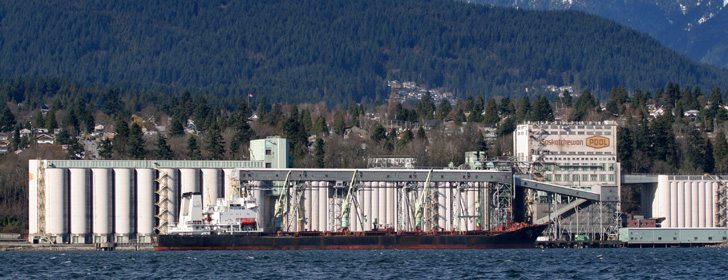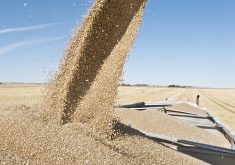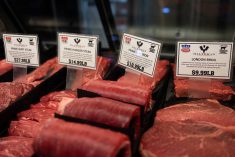Ending the Canadian Wheat Board’s role in grain transportation could improve the efficiency of the country grain handling system, says the federal grain monitor.
However, changes to the CWB will have no affect on two of the bigger problems in Canada’s grain transportation system, said Mark Hemmes, president of Quorum Corp., which serves as the federal government’s grain monitor.
Those problems are congestion at the Port of Vancouver and the increasing time it takes to load ocean vessels there, he told a University of Saskatchewan conference looking at life in the post CWB monopoly era.
Read Also

India slaps 30 per cent import duty on yellow peas
India has imposed a 30 per cent duty on yellow pea imports with a bill of lading date on or after Nov. 1, 2025.
William Drew, head of Nearco Transportation Consulting Ltd. and formerly of the Churchill Gateway Development Corp., said Canada’s other grain ports — Prince Rupert, Thunder Bay and Churchill — could suffer even while Vancouver is overloaded.
Hemmes said it is impossible to predict all the changes that will come from an open system.
However, after dozens of meetings with grain transportation stakeholders since the government announced its intention to change the CWB’s role, he said it seems there should be fewer crises in the system and more opportunities for efficiencies once grain companies have complete control over the timing of grain deliveries and other logistics.
On the other hand, he added, farmers might find their delivery options reduced as companies designate certain elevators to be commodity specific, handling only special crops or only wheat.
If efficiencies do occur, it will build on a history of improvement that has reduced the time grain sits in the system to 52 days from 68 in 1999.
“Overall, we are dealing with a system that has seen remarkable improvement in the last 10 years,” Hemmes said.
However, the time it takes to load a ship has increased to 6.2 days from 4.3 in 1999.
Drew said the loading delays make Canada’s grain industry less competitive.
Most customers buy grain on a free on board basis, meaning they pay for the grain and the vessel charter. If they know delays in loading will increase the cost of the charter, they will want to pay less for the grain.
“The longer we have vessels waiting, it will reflect on the price we are getting,” he said.
Hemmes said ensuring the right grain is at the correct location at the right time could reduce loading delays. Also, terminals need to find ways to load even while it is raining.
With the wheat board no longer directing grain to ports, Hemmes said the major grain companies will probably try to maximize use of their most profitable port facilities in Vancouver to the detriment of Prince Rupert, jointly owned by Viterra, James Richardson International and Cargill.
“There is a concern of many that think probably the most efficient terminal in North America and certainly the most efficient on the West Coast … would become a surge capacity for Vancouver,” Hemmes said.
However, Vancouver is getting crowded. The volume of all goods moving through the port, including coal, fertilizer, minerals and containers, is predicted to rise to 130 million tonnes in five to six years from 101 million now.
The mountains and Fraser River limit the railways to one line each. Meanwhile, the rail line to Prince Rupert is underused.
Drew thinks grain companies that have country and port facilities, Viterra, JRI and Cargill, will fare the best in the post CWB monopoly environment.
Companies without port facilities, such as the new voluntary wheat board, will struggle unless they can form a relationship with a port terminal owner, he said. And even if they negotiate a deal, it will likely have terms that will be difficult to meet.
Viterra and JRI can source enough grain from their own country systems to keep their port facilities busy.
“Cargill is the only company of the big three in my analysis that should go out and get grain. The other two really don’t need to,” Drew said.
There would be little financial benefit for Viterra or JRI to allow other grain companies to use their Vancouver terminals.
“I think they are probably going to look at that as, say, ‘we really don’t need their grain. Maybe someday we’ll just buy them out.’ ”















